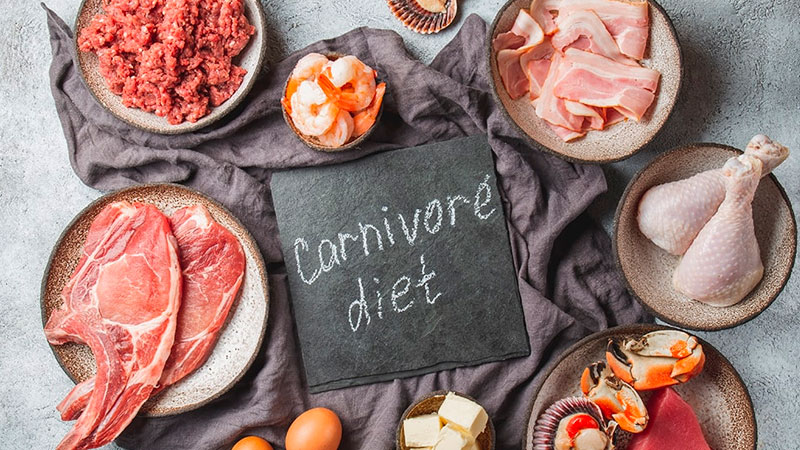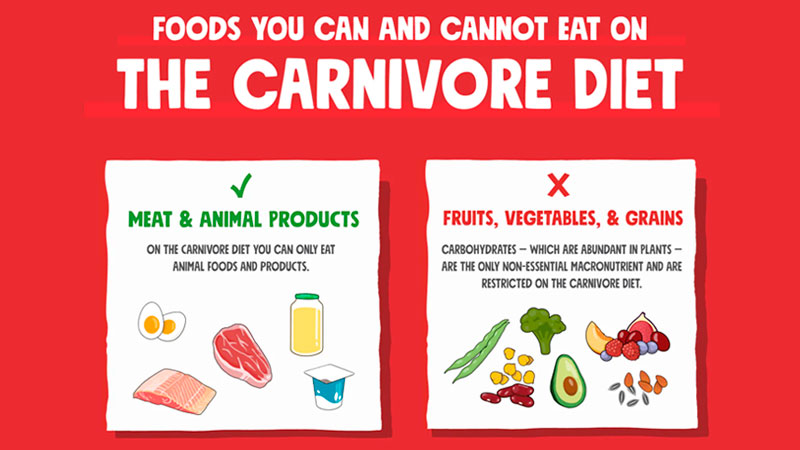The carnivore diet has been a popular topic in the health and fitness community in recent years. The idea behind this diet is simple: eat only animal-based foods and avoid any plant-based foods.
Table of Contents
Although it may sound extreme, many people claim that the carnivore diet has surprising health benefits.
In this article, we'll discuss the carnivore diet meal plan and its possible health benefits. When following a carnivorous diet, people usually eat meat, fish, eggs and dairy products, but avoid grains, legumes, fruit and vegetables.
Some people report significant weight loss, improved digestion and increased energy levels. However, it's important to note that the carnivore diet is controversial and not suitable for everyone.
What is the Carnivore Diet?
The carnivore diet is an eating plan that consists of consuming only foods of animal origin, such as meat, fish, eggs and dairy products. This diet has gained popularity in recent years, especially among those looking for a more natural and healthy approach to eating.
Proponents of the carnivore diet claim that it can help improve general health, increase energy and even help you lose weight. However, it is important to note that the diet is controversial and is not supported by many health professionals.
The carnivore diet is often compared to the ketogenic diet, which also focuses on high-fat and high-protein foods, but includes some low-carb vegetables. However, the carnivore diet is more restrictive, as it completely eliminates plant foods from the diet.
Proponents of the carnivore diet argue that humans evolved as carnivores and that the diet can help reduce inflammation, improve digestion and even help prevent chronic diseases. However, many health professionals warn that the diet is unbalanced and can lead to nutritional deficiencies in the long term.
According to Science Focus, advocates of the carnivorous diet argue that plant toxins and residual pesticides used in the production of plant-based foods are damaging our health. They claim that starchy foods only became an important part of the human diet with the agricultural revolution. Finally, it is proposed that eliminating all plant foods is the best way to eliminate sugar for weight control and metabolic health.

Potential Benefits of the Carnivore Diet
The carnivore diet is a dietary approach that focuses on animal-based foods to the exclusion of all plant foods. Although it may seem like an extreme diet, many people report significant health benefits from following it. In this section, we'll explore some of the main benefits of the carnivore diet.
Weight loss
One of the main reasons people opt for the carnivore diet is to lose weight. The diet is naturally rich in protein and healthy fats, which can help reduce appetite and calorie intake. In addition, eliminating carbohydrate-rich plant foods can help reduce insulin levels and promote fat burning.
Increased Energy Levels
Another reported benefit of a carnivorous diet is increased energy levels. Many people report feeling more alert and focused after switching to a meat-based diet. This can be attributed to the fact that meat is a rich source of nutrients, including B vitamins, iron and zinc, which are important for energy production in the body.
Reducing Inflammation
Chronic inflammation is a common problem associated with a number of health conditions, including heart disease, diabetes and arthritis. A carnivorous diet is naturally anti-inflammatory, as it eliminates many of the foods that are known to cause inflammation, such as grains and refined sugars. In addition, meat contains anti-inflammatory nutrients such as omega-3 and glutathione.
A carnivorous diet can offer a number of health benefits, including weight loss, increased energy levels and reduced inflammation. However, it is important to remember that this diet is not for everyone and should be adopted with care and under the supervision of a health professional.
Potential disadvantages
Lack of Variety
One of the main disadvantages of the carnivore diet is the lack of variety in food. As the diet focuses mainly on meat and animal products, it can be difficult to obtain the variety of nutrients needed to maintain a balanced diet. This can lead to nutritional deficiencies and long-term health problems.
Long-term health issues
Although the carnivore diet can help you lose weight quickly, it can have negative effects on your health in the long term. Excessive intake of red meat can increase the risk of heart disease, cancer and other chronic illnesses. In addition, a lack of fiber in the diet can lead to digestive problems such as constipation.
Although the carnivore diet can have benefits for some people, it is important to remember that it is not suitable for everyone. It is important to consult a health professional before starting any restrictive diet and to ensure that you are getting all the nutrients you need to maintain a balanced and healthy diet.
Examples of foods

Foods allowed in the carnivore diet include:
- Red meat (beef, pork, lamb)
- Poultry (chicken, turkey, duck)
- Fish and seafood
- Eggs
- Dairy products (cheese, butter, cream, yogurt)
Foods to avoid include:
- Grains (bread, rice, pasta)
- Legumes (beans, lentils, chickpeas)
- Fruits
- Vegetables
- Sugar
Examples of meals
Here are some examples of meals that can be included in the carnivore diet meal plan:
- Breakfast: scrambled eggs with bacon and cheddar cheese
- Lunch: grilled steak with spinach salad and feta cheese
- Dinner: baked salmon with broccoli and butter
Although the carnivore diet can be effective for some people, it's important to remember that it's not suitable for everyone. Before starting any diet, it is always advisable to consult a health professional to ensure that it is safe and suited to your individual needs.
Carnivore Diet 5-Day Meal Plan
Note: Portions and types of meat can be adjusted according to your personal needs and preferences.
Day 1:
- Breakfast: 2 eggs fried in lard. Crispy bacon.
- Lunch: Grilled steak. Pork chops. Cheddar cheese.
- Dinner: Grilled salmon with butter. Steamed prawns.
Day 2:
- Breakfast: Grilled sausage. Eggs scrambled in lard.
- Lunch: Roast chicken with crispy skin. Hard-boiled eggs.
- Dinner: Grilled lamb steak. Grilled asparagus with butter.
Day 3:
- Breakfast: Cheese omelette with bacon.
- Lunch: Grilled chicken breast. Pork sausage.
- Dinner: Grilled catfish. Steamed mussels.
Day 4:
- Breakfast: Scrambled eggs with ham.
- Lunch: Grilled ground beef. Melted cheese on top.
- Dinner: Grilled pork fillet. Raw oysters.
Day 5:
- Breakfast: Crispy bacon. Hard-boiled eggs.
- Lunch: Roast chicken breast with crispy skin. Pork sausage.
- Dinner: Grilled beef steak. Steamed mussels.
Remember to drink water throughout the day to stay hydrated.
This is just one example of a meal plan for the carnivore diet. Vary the protein sources and add diversity to ensure that you get a wide range of nutrients. Supplementation of nutrients such as B vitamins, vitamin D and minerals may be necessary due to the restriction of plant foods. It is essential to monitor your health closely and consider professional advice when following any restrictive eating plan.
Conclusion: Carnivore Diet Meal Plan
The carnivore diet has gained popularity in recent years, with many people reporting health benefits such as weight loss, improved digestion and increased energy. However, it is important to remember that this diet is highly restrictive and can be difficult to follow in the long term.
In addition, there are concerns about the lack of nutritional variety and the high consumption of saturated fats and cholesterol. It is important to consult a health professional before starting any restrictive diet, especially if you have pre-existing health conditions.
If you do decide to try the carnivore diet, it's important to make sure you're getting all the nutrients you need. This may include adding supplements or including foods such as eggs, fish and seafood, which are rich in important nutrients such as omega-3 fatty acids and B vitamins.
Ultimately, the carnivore diet can be a viable option for some people, but it's important to remember that there is no single diet that works for everyone. It's important to find a diet that works for you and is sustainable in the long term.
Eat well, live better!




